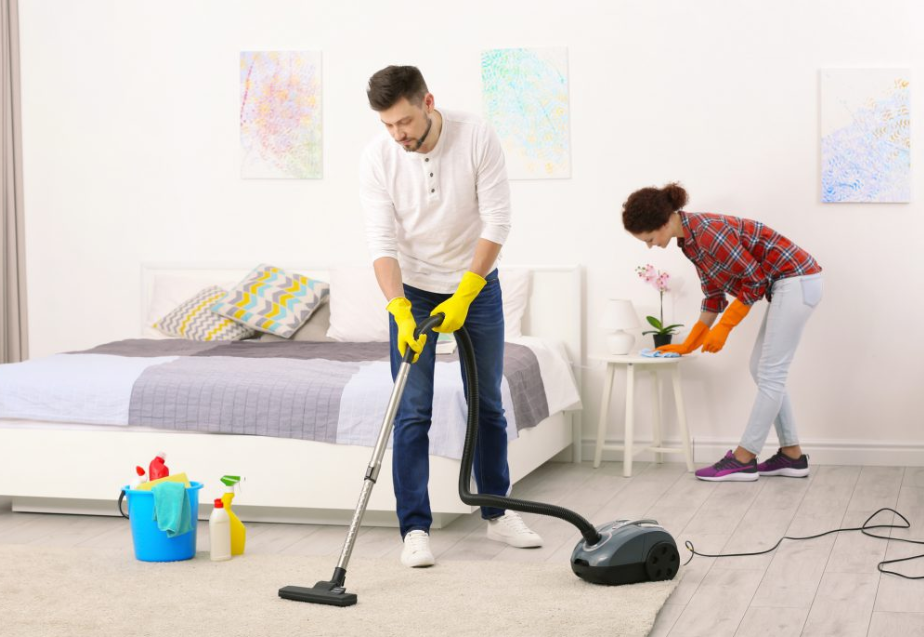Last Updated on February 2, 2023 by Rachel Hall
Introduction
The world doesn’t always end with a bang, sometimes things go out with a whimper. Sure, some relationships end because of cheating or betrayal or huge fights, but I’ve seen many fizzle out because of an endless supply of little arguments which sap the life of significant others. The death by a thousand cuts, I suppose. One of the issues I see most frequently is an unclear division of chores from someone who doesn’t want a partner, but they do want a mummy they can fuck.
The problem is the house
There are people who ignore chores accidentally. I recently had a conversation with my partner about washing the hand towels in the bathroom. Was it boring? Yes, but stick with me here. We take turns doing the laundry, and I add my towel to the basket whenever it needs a wash. He, presumably, does the same. Both of us overlooked a communal towel, and now it gets changed whenever one of us remembers. This could have easily turned into a fight, but nobody was really at fault here: there was an issue, which had been overlooked, so we found a solution without blaming the other person or escalating the situation. We’ll probably come across something similar next week.

The problem is your partner
There are people who ignore chores deliberately. The term bandied about online is “weaponised incompetence” and it makes my skin crawl. These people will deliberately try to get out of doing housework or chores, by making their partner remind them to the point that the emotional labour “isn’t worth it” or alternatively, they’ll deliberately do a bad job and then not be asked again. I saw this in action between a teenage boy and his mother, once: he washed dishes badly and told me it was so he wouldn’t be expected to do it in the future because his mother knew she’d have to redo them. That was bad enough coming from someone’s son, I cannot imagine how it would be if the person expressing it was your significant other. I feel pretty certain that he now uses the same dynamic on his girlfriend, and labels her a “nag” if she reminds him more than once.
How gender roles affect the division of labour
Some people seem to believe that household chores are the sort of thing women should do. This is unbelievably sexist and makes me think that they’ve never gone to a house occupied by a couple of gay men because they almost always have sparklingly clean abodes. To be honest, I have no time for the “traditional values” which involve removing women’s rights, expecting them to pop out babies with no control over their sexuality or womb, whilst maintaining a household and doing all of the housekeeping. If you and your partner agree that one of you will be a stay-at-home spouse and care for children, fine, but at least make sure you don’t just default to the wife just because of her gender. I think we could all do with thinking critically about how we expect housework to be divided because I know plenty of young men who would describe themselves as feminists but also unthinkingly expect their partner to be responsible for the emotional labour involved with organising housework.

Let’s solve these issues
Here’s my advice for couples who want their relationship to last and avoid arguing over housework. Sit down and list out all of the domestic chores which need to be done. Work out if they’re daily, weekly, or whatever. Divide them up into two even lists – cleaning the kitchen = hoovering, for example. Do each list for a set amount of time, like a month. Then switch. If things feel even and fair, discuss which list you’d like to work on, and take things from there. Review this as you see fit. This is the kind of thing you probably need to do when you move in together, and certainly before you get married if that’s what your long-term idea is.
Work out what’s best for you and your partner
Remember that this should be about collaboration, and playing to your strengths. If one of you has a physically demanding job and often comes home achy, maybe get them to do something that requires less exertion, like tidying after children, ironing or finance management. Find appropriate chores for each of you. If one person is very sensitive to sound, they might not be right to hoover. You may also need to take into consideration how much each of you works. If you’re a surgeon who does 60-hour work weeks and your partner has a part-time admin job, it’s not unreasonable for them to do more housework. You’re supposed to be a team, and picking up slack is ok as long as everyone is on board with it. Alternatively, if you’re a surgeon working 60 hours per week, you probably have the money to hire a cleaner to cover your share of the chores and help out. It’s about finding the right balance and seeing what works for you and your partner.
Children will not make your life easier
If you do have children, things will change. Chores might switch from “making a gourmet dinner” to “waking up to take kids to the bathroom”, and life will get less glamorous. At some point, you may be able to allocate the children some age-appropriate chores, although at first, you’ll probably spend more time reminding them, showing them and re-doing their work than you’ll actually save. It’ll be worth it in the long run, though, not least because you’ll raise someone who can do household management and won’t be a burden to their partner or live in squalor.
Conclusion
There are few things which are a bigger turnoff than feeling like a nagging, overworked spouse living in filthy conditions. It’s the kind of thing that makes one wake up one morning, pack a bag, move to a small, clean house in Paris and start running a little boutique. Or just leave your partner, because this isn’t making you happy. Let’s avoid this by having open conversations with our significant others and working out issues in the home, so you both can have a good standard of living and nobody feels exasperated or taken for granted.

Rachel Hall, M.A., completed her education in English at the University of Pennsylvania and received her master’s degree in family therapy from Northern Washington University. She has been actively involved in the treatment of anxiety disorders, depression, OCD, and coping with life changes and traumatic events for both families and individual clients for over a decade. Her areas of expertise include narrative therapy, cognitive behavioral therapy, and therapy for traumatic cases. In addition, Rachel conducts workshops focusing on the psychology of positive thinking and coping skills for both parents and teens. She has also authored numerous articles on the topics of mental health, stress, family dynamics and parenting.








Leave feedback about this